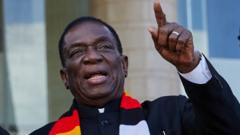Following the arrest of Ekrem Imamoglu, Istanbul's mayor, massive protests have come to the forefront in Turkey. The actions taken by President Erdogan signal a shift from competitive authoritarianism towards full authoritarian control, raising questions about the state of democracy in the nation.
Erdogan's Drastic Move: Arrest of Opposition Leader Escalates Turkish Protests

Erdogan's Drastic Move: Arrest of Opposition Leader Escalates Turkish Protests
Protests erupt across Turkey as the arrest of Istanbul Mayor Ekrem Imamoglu, a key opposition figure, raises concerns over democratic integrity and authoritarianism.
As protests flare across Turkey, the arrest of Ekrem Imamoglu, the popular mayor of Istanbul and a prominent opposition leader, has ignited public outrage. The Turkish government, led by President Recep Tayyip Erdogan, accused Imamoglu of bribery, rigging bids, and misusing personal data of citizens. Imamoglu, who has maintained his innocence, faces a daunting legal predicament as his political profile grows, particularly ahead of the upcoming presidential elections.
His arrest occurred on the same day as his party's presidential primary, drawing allegations that Erdogan's regime is attempting to stifle genuine political opposition. Political experts suggest that this incident signifies a critical move from what has been termed "competitive authoritarianism" to outright authoritarianism. Lisel Hintz, a political scientist at Johns Hopkins University, emphasizes that Erdogan’s actions illustrate an increasing unwillingness to tolerate a viable threat to his presidency, particularly from someone like Imamoglu.
As the Turkish populace takes to the streets in protest against the perceived injustice, questions arise about the future of democracy in Turkey. In a landscape where elections are still held, the effectiveness and fairness of these elections are being called into question, suggesting that efforts to control dissent could provoke further upheaval.




















